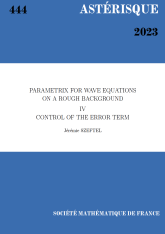Graded $C^*$-algebras and many-body perturbation theory : II. The Mourre estimate
Graded $C^*$-algebras and many-body perturbation theory : II. The Mourre estimate
Astérisque | 1992
- Consulter un extrait
- Année : 1992
- Tome : 210
- Format : Électronique
- Langue de l'ouvrage :
Anglais - Class. Math. : 35P25
- Pages : 75-96
- DOI : 10.24033/ast.182


